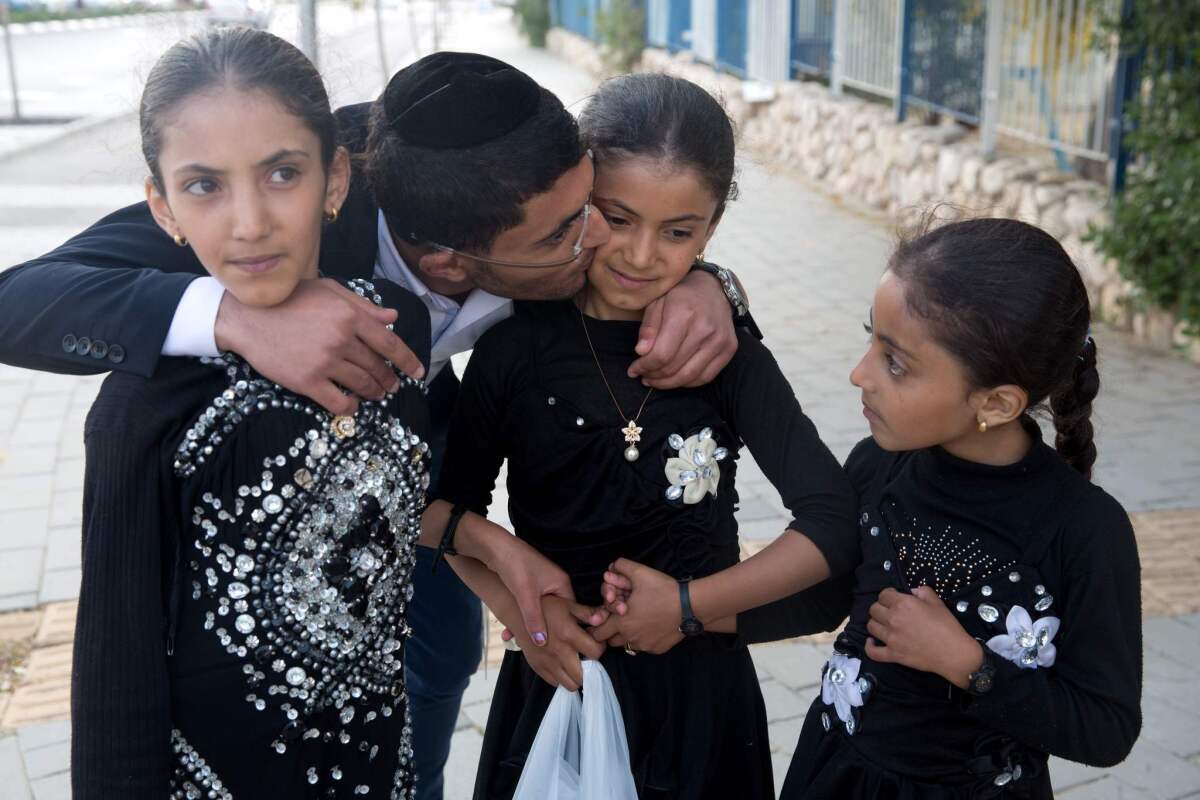A family reunion as some of Yemen’s last Jews arrive in Israel

Zion Dahari hugs his sisters Malka, right, Hodaya, center, and Ester, left, after the girls arrived at an immigration centre in the Israeli city of Beersheba on March 21 following a secret rescue operation in Yemen.
- Share via
Reporting from Beersheba, Israel — Zion Dahari left his native Yemen as part of an international effort to bring its remaining Jews to Israel.
He was 14 and not sure if he would ever see his family again.
Four years later, they were reunited in an Israeli immigration facility after 17 of his relatives were airlifted out of their war-torn homeland. After stops in Saudi Arabia and Jordan, they arrived in Israel on March 20.
“I found out they were arriving in Israel at the last minute. I dropped my study books, caught the bus and ran,” said Dahari, surrounded by his parents, six brothers and sisters and nine other relatives at the immigration center.
“All of my family are now in Israel,” he said. “I am touching the sky with excitement.”
The airlift was a clandestine operation organized by the U.S. State Department and the nonprofit Jewish Agency of Israel. The mission marked the end of efforts to rescue Jews from Yemen, said Dov Levitan, an expert on Yemenite immigration to Israel at Bar Ilan University in Tel Aviv.
Since Israel became a state in 1948, it has been helping Jews resettle there. A mission known as Operation Magic Carpet brought as many as 49,000 Jews from Yemen by 1950.
See more of our top stories on Facebook >>
More arrived over the decades, and today only about 50 Jews remain in Yemen. They have refused to leave. Most live in a compound next to the American Embassy in the capital, Sana.
Yemen’s recent descent into civil war made leaving an easier choice for Dahari’s family.
In 2014, Houthi rebels and their allies seized control of large parts of the country, including the capital. Saudi Arabia and several of its allies intervened a year ago to support Yemen’s government. More than 6,200 were killed in the conflict last year, the World Health Organization estimates.
“There was a lot of anti-Semitism and the war added another level to this,” said 40-year-old Moshe Dahari, Zion’s father, who had worked as a carpenter in the city of Raydah in the northwest of the country but recently lost his job.
“The government no longer supported anyone, we had no electricity and limited water,” he said.
NEWSLETTER: Get the day’s top headlines from Times Editor Davan Maharaj >>
Another relative, Yehiya Zindani, who arrived with his wife and their three children, described a perilous exit from Yemen. He said they had little choice but to abandon their house and leave most of their belongings behind.
“We didn’t know who was fighting who in the end,” he said. “We had attacks near our house, there was a big explosion.”
The family said that the Houthis, who are backed by Iran, helped them leave safely.
The 17 migrants will spend their first year at the immigration facility here in Beersheba in southern Israel. They will then receive financial support to live on their own, including money to put toward a modest house.
Zion Dahari recalled his own early days in Israel four years ago as “such a lonely time.”
“When I arrived I had plans to study a profession and learn Hebrew, but things didn’t work out, they didn’t happen,” he said. “It was too expensive to study, so I now study religious studies in a yeshiva.”
As for his family, he said: “They need to have patience, to be relaxed and not under pressure. This is life and they need to relax and have some perspective.”
Shuttleworth is a special correspondent.
ALSO
Toll from ISIS suicide bombing at Iraq stadium climbs to 41
Raid that killed an Islamic State leader marks a shift in U.S. strategy
The battle for Palmyra will reveal how much damage was done to Syria’s priceless relics
More to Read
Sign up for Essential California
The most important California stories and recommendations in your inbox every morning.
You may occasionally receive promotional content from the Los Angeles Times.










